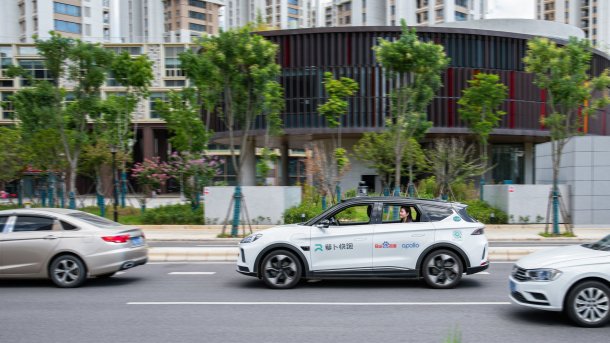Autonomous driving: Germany and China continue cooperation
Government representatives from Germany and China have signed a declaration of intent as part of Chancellor Scholz's state visit to China.

On the open road: Autonomous cab from Baidu in China.
(Bild: Baidu)
Germany and China want to continue working together and exchanging ideas on the development of technologies and international standards for automated driving. During the visit of Federal Chancellor Olaf Scholz (SPD) to China, representatives of the German government and Chinese Industry Minister Jin Zhuanglong signed a declaration of intent to this effect.
Far-reaching change
The German government believes that autonomous driving has the potential to "profoundly change the future of mobility", as the Federal Ministry of Digital and Transport announced on Tuesday. The joint declaration aims to improve the framework conditions for the technology. Among other things, this involves international standards and regulations.
Federal Minister of Transport Volker Wissing (FDP) and Franziska Brantner (Greens), State Secretary in the Federal Ministry of Economics, signed the declaration of intent on behalf of the German government. The declaration continues the dialog that Germany and China began in 2018. Wissing explained that they are currently in a crucial development phase, aiming to transition the technology from labs to roads. He highlighted that the key to achieving this lies in fair competition. He added that common standards and norms, which would be facilitated by their joint declaration of intent, are important and useful for this process.
Hot topics
The declaration is also intended to provide a basis for topics "on which there is no consensus", writes the BMDV, such as the cross-border transfer of data from China to Germany or the EU. The German government wants to work towards "tangible improvements" for German and EU companies
.
Brantner added that the "increasingly restrictive data legislation" in China sets narrow limits to cross-border data transfer in some cases. The declaration of intent should contribute to "enabling concrete progress regarding reciprocal data transfer – and this in respect of national and EU data law." He emphasized that they would work towards achieving tangible results in this regard.
Scholz: "Fair competition"
During the German government's visit to Beijing – in addition to Scholz, Wissing and Brantner, Agriculture Minister Cem Özdemir and Environment Minister Steffi Lemke (both Greens) were also present – differences emerged on economic issues. Scholz also emphasized the need for "fair competitive conditions" and equal market access.
The German government is pursuing the goal of reducing economic dependence on China. Xi emphasized that cooperation between Germany and China does not represent a risk, but rather "a guarantee for the stability of relations". Both heads of state emphasized that they want to expand economic cooperation.
(vbr)